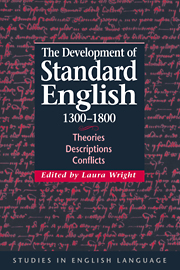Book contents
- Frontmatter
- Contents
- List of contributors
- Acknowledgements
- Introduction
- Part one Theory and methodology: approaches to studying the standardisation of English
- Part two Processes of the standardisation of English
- 7 Standardisation and the language of early statutes
- 8 Scientific language and spelling standardisation 1375–1550
- 9 Change from above or from below? Mapping the loci of linguistic change in the history of Scottish English
- 10 Adjective comparison and standardisation processes in American and British English from 1620 to the present
- 11 The Spectator, the politics of social networks, and language standardisation in eighteenth-century England
- 12 A branching path: low vowel lengthening and its friends in the emerging standard
- Index
10 - Adjective comparison and standardisation processes in American and British English from 1620 to the present
Published online by Cambridge University Press: 30 September 2009
- Frontmatter
- Contents
- List of contributors
- Acknowledgements
- Introduction
- Part one Theory and methodology: approaches to studying the standardisation of English
- Part two Processes of the standardisation of English
- 7 Standardisation and the language of early statutes
- 8 Scientific language and spelling standardisation 1375–1550
- 9 Change from above or from below? Mapping the loci of linguistic change in the history of Scottish English
- 10 Adjective comparison and standardisation processes in American and British English from 1620 to the present
- 11 The Spectator, the politics of social networks, and language standardisation in eighteenth-century England
- 12 A branching path: low vowel lengthening and its friends in the emerging standard
- Index
Summary
Introduction
In this paper we will address the standardisation processes in American and British English with reference to competing forms of adjective comparison. The primary competition is between the older inflectional comparative (e.g. faster) and the newer periphrastic construction (e.g. more beautiful), with the much less frequent double comparative (e.g. more richer) now considered non-standard. In this study we will focus on the paradigm of the non-defective adjectives, a central category illustrated by the above uses. We thus omit from discussion the group of defective (or heterogeneous) adjectives (e.g. good, better, best).
Our main sources of data here will be the pilot version of the Corpus of Early American English (1620–1720) and ARCHER (A Representative Corpus of Historical English Registers; see Biber et al. 1994a and 1994b). For the purposes of this study we have taken from ARCHER some 750,000 words representing five text types sampled from the subperiods containing texts from both British and American English, i.e. 1750–1800, 1850–1900, and 1950–1990. Together, this yields a corpus of nearly a million words which allows us to address similarities and differences in standardisation processes affecting these two varieties of English at the same time as it tests the potential of ARCHER for this type of comparative study. Both corpora comprise various text types, which allows us also to explore the question of the extent to which genre or text type influences standardisation. Previous diachronic research has revealed both word structure and text type as important factors.
- Type
- Chapter
- Information
- The Development of Standard English, 1300–1800Theories, Descriptions, Conflicts, pp. 171 - 194Publisher: Cambridge University PressPrint publication year: 2000
- 12
- Cited by



